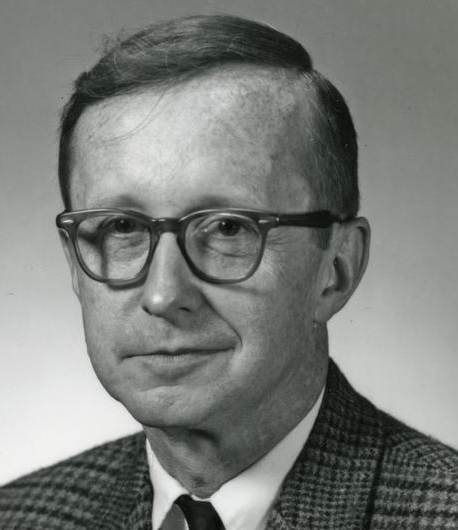
Courtesy Indiana University Archives
When he retired from teaching in 1988, Robert H. Ferrell held the elite rank of distinguished professor of history at Indiana University. He was an internationally recognized and much-admired scholar and teacher of US foreign relations and the American presidency, especially the life of Harry S. Truman. He continued writing after he retired, so that by the time of his death, he was author or editor of more than 60 books of history, including several best-sellers. This notable career emanated from his service in the European theater of World War II.
The elder of two sons of Ernest Hugh Ferrell Sr.—a bank manager and veteran of World War I—and Edna Rentsch, Robert was born on May 8, 1921, in Cleveland. The family lived first in a suburb of Cleveland and then, after the Wall Street crash, in towns where Ernest worked to revive troubled banks for the federal Reconstruction Finance Corporation. Edna taught school. In Waterville, Ohio, where the family finally settled in the mid-1930s, Robert took piano lessons and, unlike many boys his age, came to love classical music and became a full-time church organist as a student. In the fall of 1939, he enrolled at nearby Bowling Green State University, majoring in education with a concentration in primary school music.
On December 7, 1941, the Imperial Japanese Navy interrupted Robert’s respectable but unexceptional progress. Years later, he reflected on his naïveté: “It was 4:30 in the afternoon, and the church was getting dark, and my parents came to pick me up. And Dad said, ‘The Japanese have bombed Pearl Harbor.’ I didn’t know where Pearl Harbor was.” Sensing a duty, he enlisted in the US Army Air Corps the following July, and was assigned to the 9th Air Force service command. He entered the war in Cairo the following December, as a chaplain’s assistant in its headquarters squadron. In the weeks after D-Day in Normandy, Ninth Air Force planes led the American tank formations that broke through German defenses; by that time, Ferrell had become a staff sergeant and chief records clerk, serving on airfields behind the combat zones.
By war’s end, Ferrell, now 24 years old, had a new purpose.He completed his bachelor’s in music education at Bowling Green in October 1945. But a year later, he earned a second bachelor’s, in history. His primary activity now was to convey to others what had led to the wars of the 20th century. But he did not forsake music. He had played keyboard instruments for religious services in North Africa and for his own enjoyment in England and France, and would continue to refine his technique for the rest of his life.
Admitted to Yale for advanced study, Ferrell received his master’s degree in 1948 and proceeded for a PhD under the guidance of Pulitzer Prize–winning professor Samuel Flagg Bemis. Ferrell wrote his dissertation on the Kellogg-Briand Pact, the 1928 agreement to outlaw war signed by the United States, France, Germany, and 12 other nations. This agreement had failed, and Ferrell determined to find out why. His thesis—a tightly written analytical narrative—received the university’s prestigious John Addison Porter Prize in 1951. Yale University Press published Peace in Their Time: The Origins of the Kellogg-Briand Pact in 1952; it won the AHA’s George Louis Beer Prize and remains in print.
After a year at Michigan State University, in 1952 he accepted a position as assistant professor at Indiana University in Bloomington. Four years later, he married Lila Sprout, whom he had met at Michigan State. Ferrell’s ascent in the discipline helped Russian specialist Robert F. Byrnes build one of the premier departments and the editorial home for both the Journal of American History and the American Historical Review. In 1967, Ferrell joined with colleagues at other universities to establish the Society for Historians of American Foreign Relations (SHAFR). Four years later, he was elected its president. Soon after he retired, his former students instituted SHAFR’s Robert H. Ferrell Book Prize. And in 2007, 17 of them published a Festschrift entitled Presidents, Diplomats, and Other Mortals: Essays Honoring Robert H. Ferrell.
Robert Hugh Ferrell died peacefully in Chelsea, Michigan, on August 8, 2018. His daughter Carolyn, her husband Lorin Burgess, and their children Amanda and Samantha survive him. Sadly, Lila had died 16 years earlier, after 45 years as his devoted partner.
William B. Pickett
Rose-Hulman Institute of Technology (emeritus)
Tags: In Memoriam North America

This work is licensed under a Creative Commons Attribution-NonCommercial-NoDerivatives 4.0 International License. Attribution must provide author name, article title, Perspectives on History, date of publication, and a link to this page. This license applies only to the article, not to text or images used here by permission.
The American Historical Association welcomes comments in the discussion area below, at AHA Communities, and in letters to the editor. Please read our commenting and letters policy before submitting.
Comment
Please read our commenting and letters policy before submitting.






